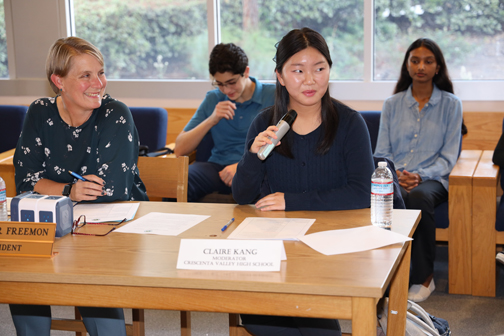
Photo provided by GUSD
By Mikaela STONE
The GUSD school board on Oct. 24 gave students a chance to make their opinions heard at the fourth annual Student Voices panel, composed of representatives from the five Glendale Unified high schools and moderated by Crescenta Valley High School student Claire Kang, covering opinions on health and safety, academic support and campus culture.
When it came to health and safety, students agreed followup was necessary after stressful events on campus, such as the recent event at CVHS when a stranger entered the school. Though he was not armed, students were not debriefed on the matter until weeks later, leading to rumors that frightened them. One student suggested a push notification system in which students could be notified immediately regarding concerns from the school or district.
One question posed to students was prevention of vandalism. In addition to generalized graffiti, hate speech such as swastikas have marred bathrooms, unsettling some students. A slew of suggestions have been made including having an anonymous reporting system via QR that ensures that even if perpetrators were not caught the vandalism would be cleaned up in a timely manner. Clark Magnet High School’s solution to the problem is the Five Star app that tells teachers how long students are in the bathroom. However, other students brought up concerns about restriction of bathroom use affecting students who menstruate disproportionately. The issue with maintaining safe bathrooms is finding a balance between observation to prevent violation of policy and the preservation of privacy.
Other bathroom issues discussed involved the use of drugs during passing periods and breaks that prevent other students from using the restrooms for their intended purpose. One student suggested the application of additional smoke detectors to detect students vaping. Another student asserted that students who do drugs need “support and treatment rather than using punitive measures.” She continued by saying that students knew their drug use was wrong, but feared the school’s no leniency policy, preferring to hide addiction due to this fear rather than risk expulsion when seeking help. Board President Jennifer Freemon agreed that a balance needed to be struck between punishment and leniency and, while she knew it would be difficult to do so, student input was appreciated.
The most discussed matter on academic support was that of the block schedule. Students agreed that there were pros and cons to the length of block schedules. While some students felt they were allowed more time to understand material, others complained that teachers would overestimate the amount of time needed and have a rushed ending to class.
One student commented, “At some point [students] are going to lose [their] attention span.”
One advantage to block scheduling is extra time set aside between classes for homework, but retention of the knowledge needed for homework lessens from day to day. Students encouraged teachers to discuss homework loads with one another as another complaint regarding block scheduling is that teachers feel encouraged by the time between classes to increase the quantity of work.
The gathered students all agreed that they wanted more options when it came to preparation for college and future financial responsibilities. Clark Magnet boasts a college and career prep class that students are proud of. In an increasingly difficult economic system, students wish to be prepared for their future, including how to write resumes, do taxes and budget.
Regarding campus culture, many students present expressed their enjoyment of pep rallies, and suggested a Google form where students could vote for pep rally themes to entice those who were not interested in the rallies. Of the spirit weeks leading up to pep rallies, most students were pleased with their schools’ available activities. Students agreed that school spirit was easier when teachers also expressed it. The students from Clark Magnet praised one such teacher, Nick Doom, for his excitement over football games that inspired them to attend as well.
Overall, students seemed pleased with the school district but wished to share their voices more than just at the Student Voice meetings. Some students suggested an optional monthly or weekly fillable form for opinions to be heard.
